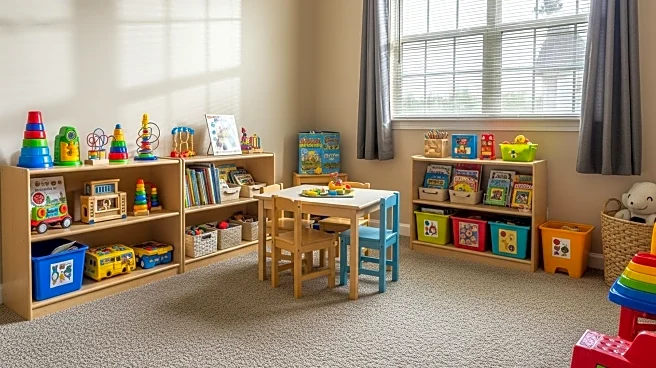What's Happening?
A bipartisan group of U.S. senators has introduced a new bill aimed at expanding affordable child care access across the nation. The legislation seeks to update the Child Care and Development Block Grant, which has not been revised in over a decade. Senators Deb Fischer, Kirsten Gillibrand, John Hickenlooper, and Susan Collins are spearheading the effort to address the rising costs and accessibility issues faced by American families. The bill proposes to increase the supply of child care providers and offers states the flexibility to assist families above the current income eligibility through a waiver process. It also aims to support in-home child care providers, particularly in rural areas, by providing technical assistance for developing shared services. The initiative is backed by the First Five Years Fund, an advocacy group promoting bipartisan support for early learning and child care.
Why It's Important?
The introduction of this bill is significant as it addresses a critical issue affecting millions of American families: the affordability and accessibility of child care. According to the Economic Policy Institute, over 40% of U.S. families struggle to access affordable child care, with costs for an infant exceeding rent in 17 states. By modernizing the grant program, the bill aims to alleviate financial stress on families, enabling parents to balance career advancement with child care responsibilities. The legislation could lead to increased economic productivity by allowing more parents to participate in the workforce. Additionally, it highlights a rare area of bipartisan cooperation in a politically polarized environment, suggesting potential for further collaborative efforts in addressing family-related issues.
What's Next?
If passed, the bill will require states to consult with parents, providers, and employers to develop comprehensive child care plans, particularly in areas identified as child care deserts. The legislation's progress will be closely monitored by advocacy groups and stakeholders in the child care industry. The bill's success could pave the way for additional reforms and investments in child care infrastructure, potentially influencing future policy decisions at both state and federal levels.
Beyond the Headlines
The bill's focus on supporting in-home child care providers in rural areas addresses a less visible aspect of the child care crisis. By providing technical assistance and developing provider networks, the legislation could enhance the quality and reliability of child care services in underserved regions. This approach not only benefits families but also supports local economies by creating job opportunities and fostering community development.












